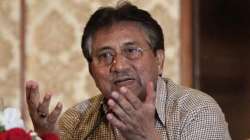Pakistan court adjourns hearing in treason case against Musharraf till June 12
The former president's lawyer Salman Safdar, in an application on behalf of Musharraf, stated that despite strong willingness and eagerness to return to Pakistan, the life-threatening ailments and medical complications have forced him not to appear before the special court.

Pakistan's former military dictator Pervez Musharraf did not turn up for the treason trial against him on Thursday citing deteriorating health and a special court accepted his plea to postpone the hearing until after Ramazan, according to a media report.
The former president's lawyer Salman Safdar, in an application on behalf of Musharraf, stated that despite strong willingness and eagerness to return to Pakistan, the life-threatening ailments and medical complications have forced him not to appear before the special court.
The 75-year-old former president also apologised for not appearing before the court and requested it to postpone the hearing until the end of Ramazan, which falls on June 4.
"Musharraf should be given an opportunity to appear so as to fulfil the requisites of justice," Safdar said.
The counsel further clarified that Musharraf was unable to speak and that he could not respond to the questions in court without his client's assistance.
The three-member bench, headed by Justice Tahira Safdar, admitted Musharraf's plea and adjourned the hearing till June 12, the Dawn reported.
The court also issued a notice to the government over a plea for acquittal of Musharraf in the case.
A special court indicted Gen (Retd) Musharraf for high treason in March 2014. The previous Pakistan Muslim League-Nawaz (PML-N) government had filed the treason case against Musharraf over the imposition of extra-constitutional emergency in November 2007.
Musharraf left for Dubai in 2016 to "seek medical treatment" and has not returned since.
Last month, Musharraf was admitted to a hospital in Dubai after suffering a reaction from a rare disease for which he is already under treatment.
Giving details of his ailments, the application stated that Musharraf is suffering from cardiac amyloidosis (congestive heart failure), chronic kidney disease (high creatinine in renal system), excessive somnolence (hypersomnia), spinal injury and fracture.
It stressed that the former president came to Pakistan on March 24, 2013, on his own free will to face the Benazir Bhutto assassination case, judges’ detention case and Akbar Bugti case and that the high treason case was initiated subsequent to his arrival in the country.
The application highlighted that Musharraf's absence from the trial court was not deliberate, wilful or an excuse to avoid the ongoing criminal proceedings, the report said.
In the light of genuine life-threatening illness and permission by the government to travel abroad for the treatment, he should not be treated as fugitive or proclaimed offender as was declared through the special court's interim order of June 19, 2016, it said.
According to the latest assessment of his health on April 29 at the American Hospital in Dubai, Musharraf’s health has been termed unsafe in case he discontinued treatment and travelled, the application argued.
On April 1, the Supreme Court directed the special court to proceed with the trial on the next date of hearing (May 2) and in case the former president surrendered and appeared before it, he would be entitled to record his statement. If he failed to appear, the special court is empowered to proceed against him even in his absence.